How Big Oil Fooled the World: The Untold Story of Climate Change Denial

For decades, major oil, gas, and coal corporations have not only profited from fossil fuel consumption but also actively worked to suppress the truth about its consequences. Internal documents and research dating back to the 1970s reveal that these companies were well aware of the environmental risks posed by carbon emissions. Yet rather than inform the public, they chose a different path—one of manipulation and obstruction. This deliberate misinformation campaign gave birth to climate change denial, a coordinated effort that questioned settled science and manufactured doubt in the public mind.
Using front groups disguised as grassroots organizations—astroturf campaigns—and elaborate PR strategies, these companies stalled environmental regulation for decades. One of their most insidious tools was greenwashing: branding themselves as environmentally conscious while continuing practices that fueled the climate crisis. Their tactics not only delayed meaningful climate action but also undermined public trust in science and government.
This article delves into the story of climate change, tracing how early warnings were buried beneath layers of deception. It explores the systematic efforts behind climate change denial and shines a light on the investigations, whistleblowers, and growing public awareness that are finally beginning to hold these corporations accountable.
Table of Contents
1. Early Internal Warnings vs. Public Denial
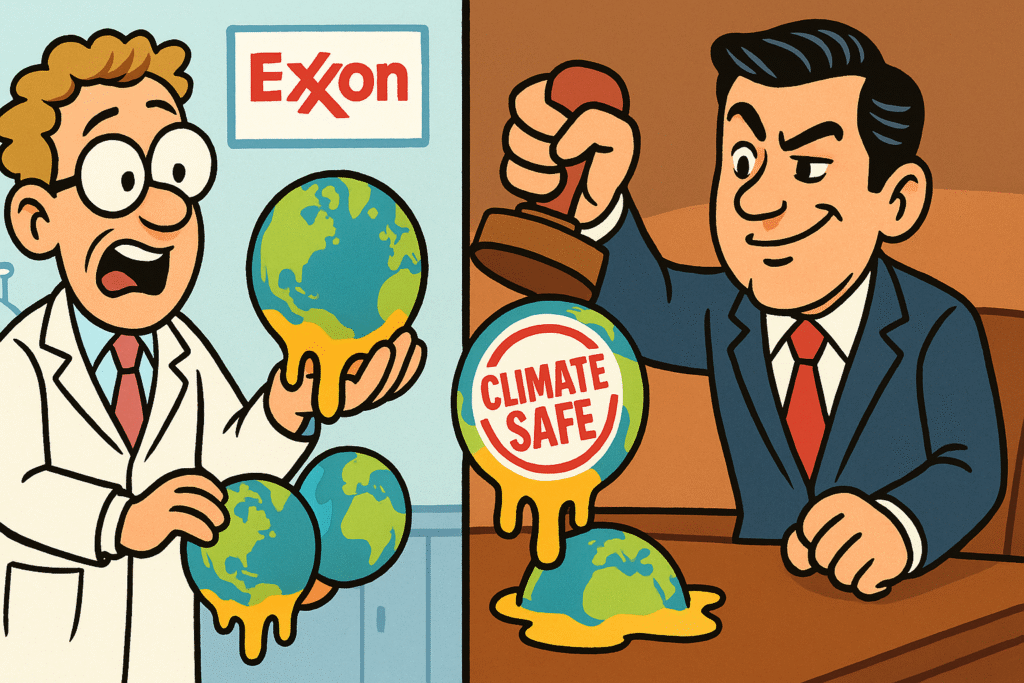
Early Internal Warnings vs. Public Denial
Internal Research
As early as the 1970s, Exxon’s own scientists were not only aware of climate risks—they were ahead of their time. They conducted sophisticated climate modeling and published peer-reviewed studies that accurately forecast global temperature rises and confirmed the impact of greenhouse gases. This buried research marks a crucial turning point in the story of climate change—where truth was known behind closed doors, yet deliberately withheld from public discourse.
Public Messaging
While internal findings confirmed the urgency of climate action, Exxon’s public behavior told a different story. Throughout the 1980s, the company funded full-page ads and opinion pieces that cast doubt on climate science, echoing tactics used by the tobacco industry to delay health regulations. These campaigns played a foundational role in manufacturing climate change denial—a strategy that seeded public confusion and slowed progress for decades. Organizations like ClientEarth have since investigated these disinformation efforts, demanding corporate accountability.
The Exposé
In 2017, a groundbreaking study by Geoffrey Supran and Naomi Oreskes applied machine learning to over 200 internal and external Exxon documents. The analysis, published in Environmental Research Letters, revealed a stark contrast: more than 80% of private memos acknowledged human-caused climate change, while over 80% of the company’s public communications emphasized doubt or minimized the risks. As reported in Wired, this was not a case of mixed messaging—it was a deliberate pattern of deception. These revelations confirmed that greenwashing was not an afterthought but a calculated tool to preserve corporate interests while the planet warmed.
2. Front Groups and Astroturf Campaigns
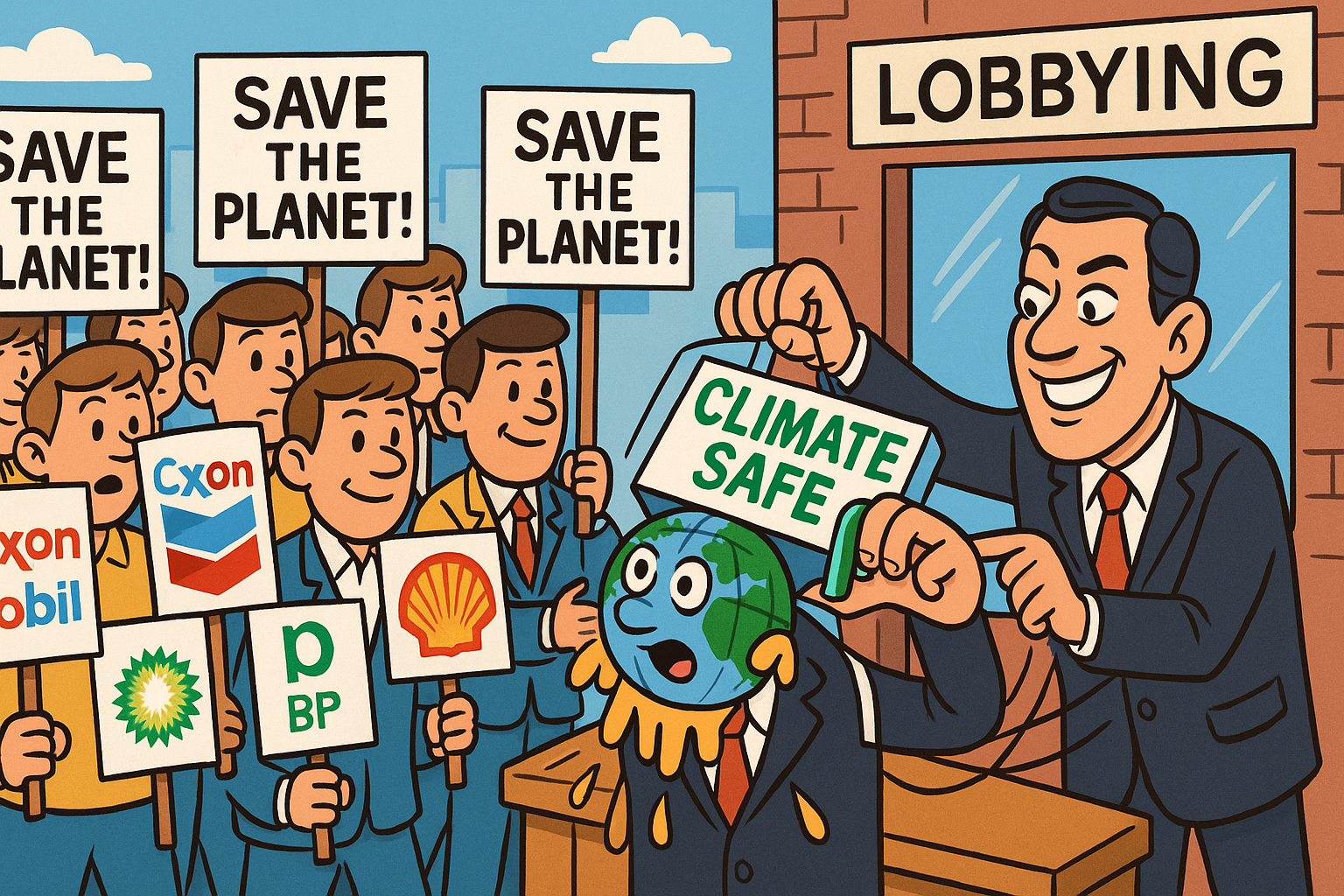
Funding Network
A crucial chapter in the story of climate change is how fossil fuel corporations operated from the shadows. Major oil, gas, and coal companies—including ExxonMobil, Chevron, and others—secretly funneled millions of dollars into third-party think tanks and trade groups. Organizations like the American Petroleum Institute and the Global Climate Coalition published biased reports and sponsored scientists to cast doubt on mainstream climate science. These groups became intellectual hubs of climate change denial, amplifying pseudoscience under the guise of objective research.
Astroturf Tactics
To make their disinformation appear organic, these think tanks deployed astroturf campaigns—fake grassroots movements designed to mimic public sentiment. Backed by fossil fuel lobbyists, they flooded Congress with form letters opposing climate legislation and staged orchestrated protests against environmental regulations. As exposed by The Guardian, many of these so-called “citizen” actions were funded or coordinated by industry PR firms, giving the illusion of public resistance. This manufactured dissent delayed regulations and further entrenched greenwashing narratives in the public sphere.
Senate Probe
The scope of this deception came under intense scrutiny in 2023, when the U.S. Senate Budget Committee released a report detailing how fossil fuel executives orchestrated and bankrolled this disinformation network. Despite knowing internally that urgent reductions in greenhouse gas emissions were needed, these leaders continued to spread misleading narratives to protect profits. The report confirmed what many climate advocates had long alleged: the public was intentionally misled as part of a widespread campaign of climate change denial—carefully designed, lavishly funded, and devastatingly effective.
3. Greenwashing and False “Clean” Claims
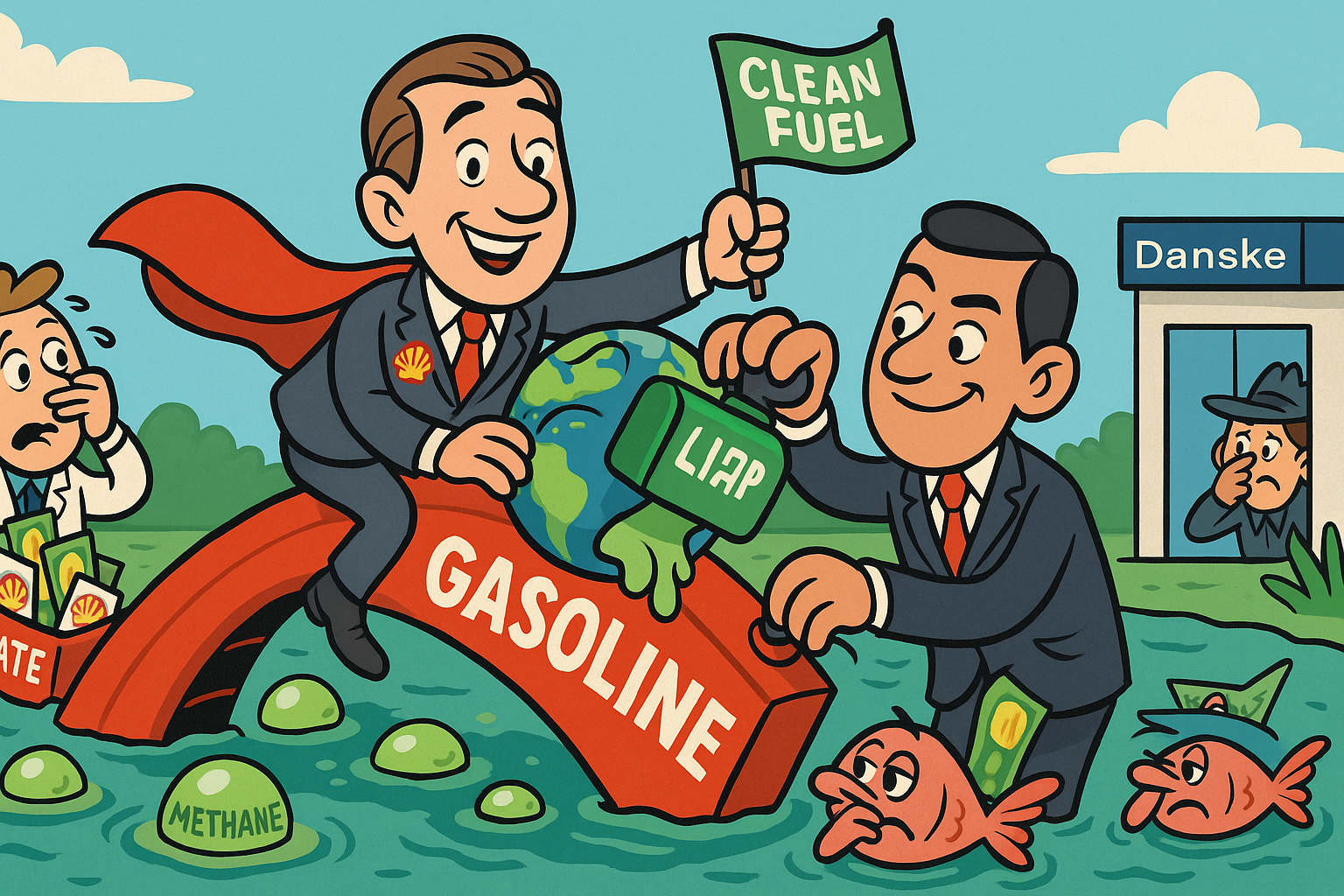
Natural Gas as a “Bridge Fuel”
One of the most persistent myths in the story of climate change is the notion that natural gas is a “clean” or “transitional” fuel. Energy giants such as Shell and ExxonMobil promoted natural gas as a low-carbon bridge to renewable energy. However, this narrative has been exposed as misleading. Internal documents and scientific findings show that methane leaks—a potent greenhouse gas—can completely offset any supposed climate advantage of natural gas over coal. A 2022 investigation by The Guardian revealed how these companies ignored internal warnings while publicly pushing gas as a climate solution. This is greenwashing in its most dangerous form: marketing a false solution while perpetuating the problem.
Token Sustainability Investments
Every year, fossil fuel companies publish slick “sustainability reports” filled with buzzwords like net-zero, low-carbon, and energy transition. But behind the PR gloss lies a stark truth: their investments in clean energy are minuscule. According to the Union of Concerned Scientists, many of these so-called commitments amount to less than 1% of their total capital expenditures. Meanwhile, they continue to pour billions into new fossil fuel extraction projects. These token gestures are designed to obscure reality and maintain social license—classic greenwashing tactics that shield companies from accountability while they fuel the climate crisis.
ClientEarth’s Greenwashing Audit
A landmark investigation by ClientEarth exposed the depth of fossil fuel disinformation. Their audit found that since 1998, ExxonMobil alone had spent more than $33 million on advertising campaigns that promoted a green image while downplaying or denying the environmental impacts of their operations. These ads were part of a coordinated campaign of climate change denial, crafted to influence public opinion, stall regulation, and defend the industry’s bottom line. The findings underscore how greenwashing is not a side effect—it’s a deliberate communications strategy rooted in decades of denial.
4. Regulatory and Legal Revelations
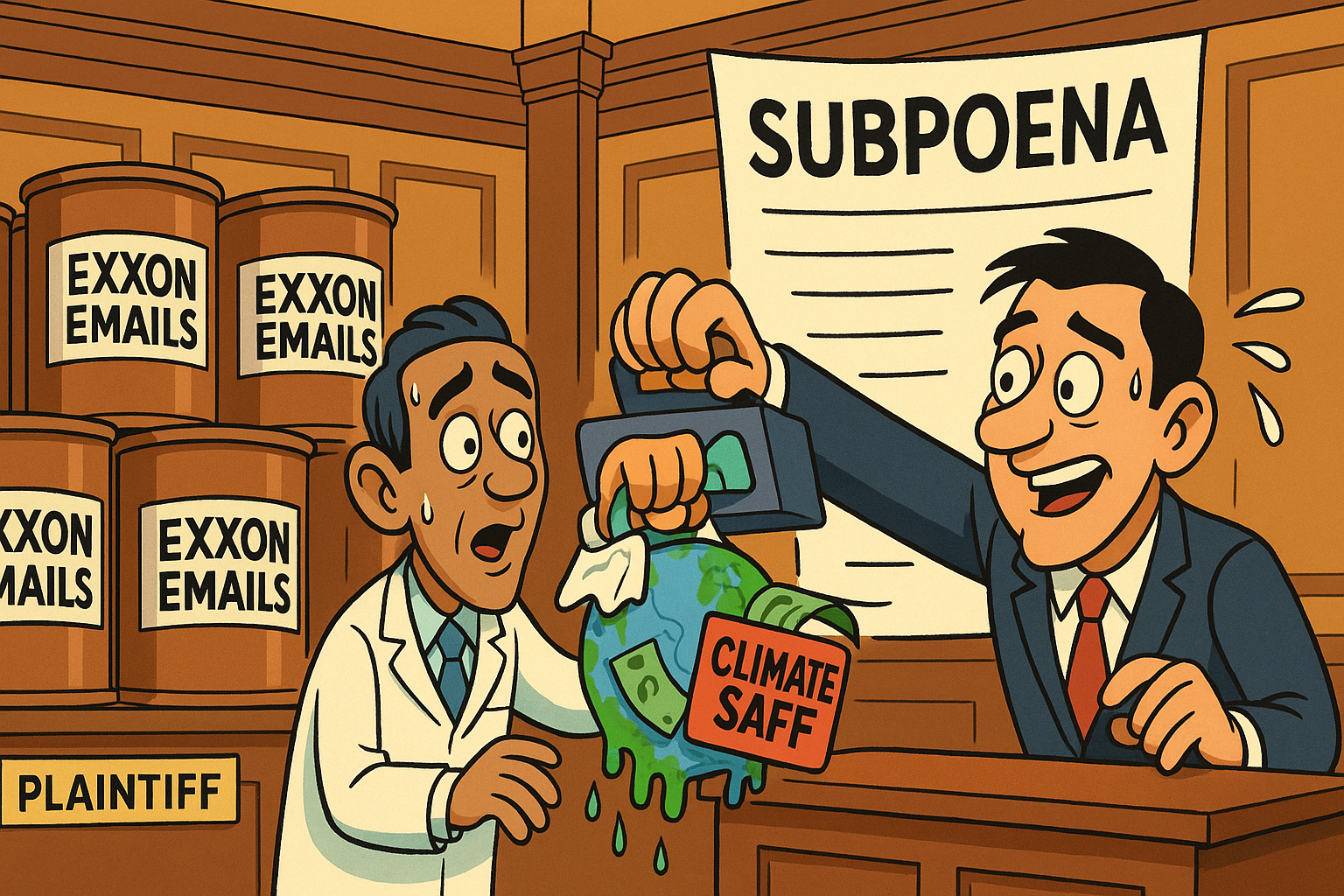
New York AG Probe
A major turning point in the story of climate change accountability came between 2015 and 2018, when the New York Attorney General’s office launched an extensive investigation into ExxonMobil. The probe subpoenaed nearly four decades of internal communications, uncovering evidence that Exxon had actively worked to undermine climate science while privately acknowledging its validity. The documents showed a strategic effort to mislead investors about the financial risks posed by global warming. Publicly, Exxon dismissed the inquiry as politically driven—but behind closed doors, it revealed an entrenched culture of climate change denial and deceptive shareholder communications.
Litigation Surge
Across the United States, momentum has grown for legal accountability. More than 25 cities and states have filed lawsuits against major fossil fuel companies, accusing them of racketeering, consumer fraud, and public nuisance. These legal actions are built on a mountain of evidence—internal memos, disinformation campaigns, and funding ties to denialist front groups—all of which paint a picture of systematic deception. The Union of Concerned Scientists has extensively documented how these lawsuits represent an emerging front in the effort to confront decades of climate change denial and hold corporations financially liable for the environmental and social costs they’ve helped cause.
International Scrutiny
The push for accountability isn’t confined to the U.S. International regulators are also stepping up. The EU and UK have opened investigations into companies like Shell, BP, and TotalEnergies for making misleading claims about their emissions reductions and sustainability targets. These cases have resulted in fines and mandates for improved disclosure, exposing the gap between what these companies promise and what they actually do. This growing scrutiny reveals that greenwashing is now recognized as a form of consumer and investor deception on a global scale—not just bad PR, but a regulatory liability.
5. Impact on Public Policy and Trust
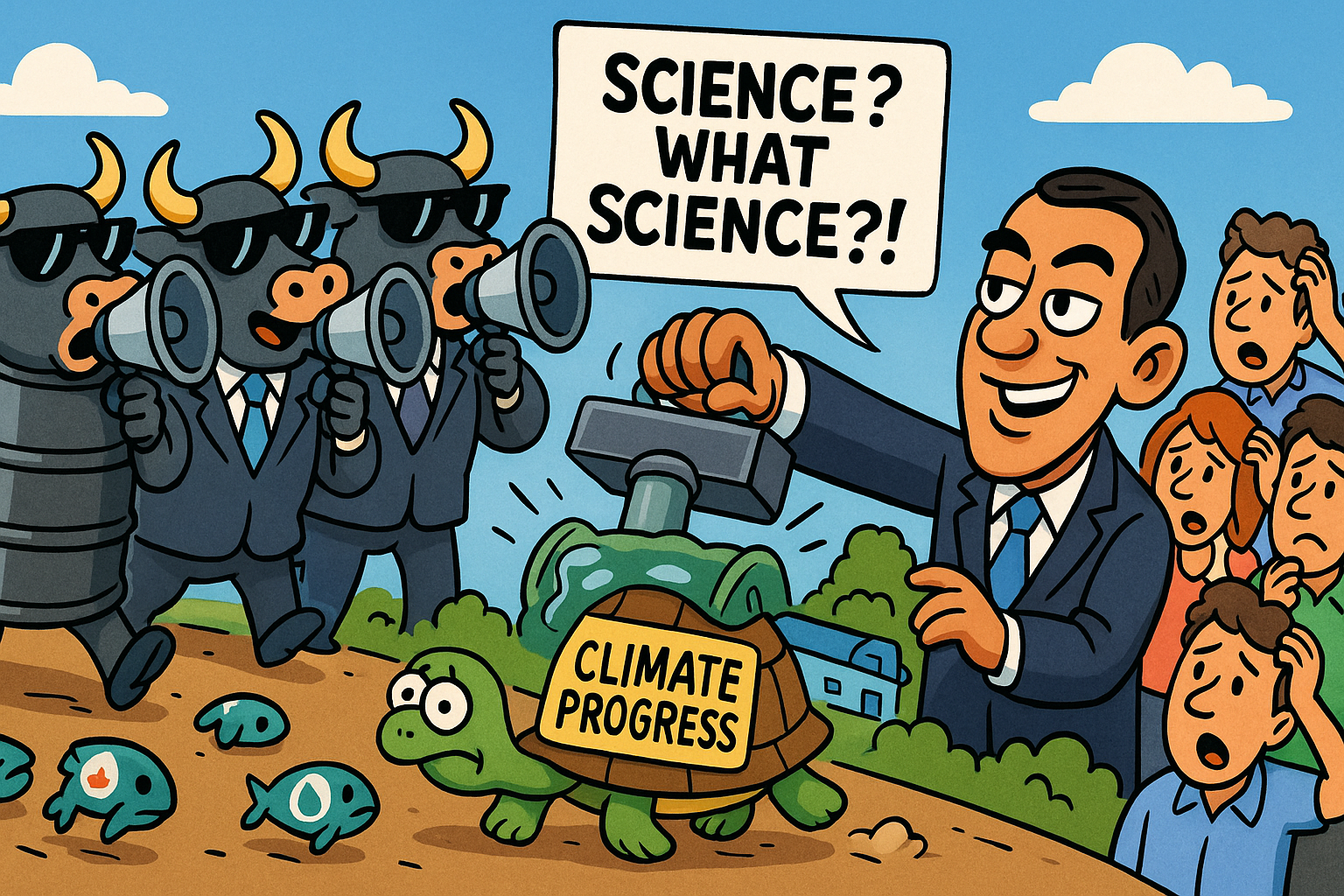
Delayed Climate Action
Perhaps the most devastating consequence in the story of climate change is the lost time. By aggressively funding climate change denial and sowing confusion, fossil fuel interests effectively bought themselves two crucial decades of inaction. During this period—spanning the late 1980s through the 2000s—CO₂ emissions surged unchecked, leading to more extreme heatwaves, intensified storms, and accelerating sea level rise. The costs are now irreversible in many regions, with global climate impacts growing more severe and more frequent. This delay was not incidental; it was the intended outcome of a strategy designed to protect profits over people.
Erosion of Public Trust
The damage didn’t stop with policy—it extended to public perception. Public confidence in climate science plummeted throughout the 1990s and early 2000s, exactly when fossil fuel companies ramped up spending on denialist think tanks and PR campaigns. A report by Business & Human Rights Resource Centre highlights how industry-led disinformation corroded trust in scientific institutions and left a legacy of skepticism, particularly in the U.S. Even today, the lingering effects of these campaigns hinder consensus on climate legislation and delay urgent mitigation efforts.
Push for Transparency
In response to decades of deception and greenwashing, governments, investors, and the public are now demanding transparency. In the U.S., the SEC has introduced climate-risk disclosure rules, requiring companies to reveal their exposure to climate threats and their emissions performance. Shareholder resolutions increasingly call for mandatory lobbying disclosures, ensuring that corporate lobbying aligns with public climate commitments. These reforms aim to prevent history from repeating itself, forcing companies to confront their environmental impact honestly and making it harder to mislead through polished sustainability rhetoric.
From Denial to Accountability: Ending the Era of Climate Deception
The decades-long story of climate change denial by major fossil fuel companies highlights a dangerous gap between what corporations knew internally and what they chose to tell the public. Despite their own scientists accurately forecasting global warming and its catastrophic consequences as early as the 1970s, these companies invested in front groups, misleading PR campaigns, and astroturf tactics to question the science, delay regulations, and protect profits. Their use of greenwashing—presenting false or exaggerated claims of environmental responsibility—further masked their role in driving the climate crisis.
This deliberate deception came at a steep cost: not just in lost time and rising emissions, but in public confusion, political gridlock, and a deep erosion of trust. Fortunately, the tide has begun to turn. Thanks to the tireless work of investigative journalists, courageous whistle-blowers, and regulatory scrutiny, the truth is being exposed. Legal challenges, shareholder pressure, and new transparency rules—such as the SEC’s climate disclosure mandates—are gradually holding these corporations to account.
As we face the intensifying impacts of climate change, it is critical that future decisions are rooted in science, not spin. The lessons of the past must guide us forward: deception can no longer be tolerated, and delay is no longer an option. Only through truth, transparency, and bold action can we begin to repair the damage—and build a future where accountability is non-negotiable, and climate justice is finally prioritized.
What is climate change denial?
Climate change denial refers to the deliberate rejection, distortion, or undermining of scientific evidence about global warming. It often involves spreading misinformation to cast doubt on the reality, causes, or urgency of climate change. Major fossil fuel companies have historically funded climate change denial to protect their business interests.
How did fossil fuel companies contribute to climate change denial?
Fossil fuel companies like ExxonMobil and Shell financed think tanks, front groups, and PR campaigns that questioned climate science. Despite having internal research confirming global warming, they publicly promoted uncertainty—a calculated move that became central to the story of climate change in the modern era.
What is greenwashing and how does it relate to climate change?
Greenwashing is the practice of falsely presenting an organization as environmentally responsible while continuing harmful practices. Fossil fuel companies often used greenwashing by promoting misleading ads, overstating renewable investments, and branding natural gas as “clean”—even as their emissions continued to rise.
Why is the story of climate change so closely tied to corporate misinformation?
The story of climate change isn’t just about science—it’s also about power and influence. Fossil fuel corporations used their resources to shape public opinion, delay regulation, and protect profits, even when internal documents revealed they understood the dangers of global warming decades ago.
What role did front groups and astroturf campaigns play in climate disinformation?
Front groups—often posing as independent or grassroots organizations—were used by fossil fuel interests to disseminate climate change denial. Through fake protests, form letters to lawmakers, and misleading “expert” testimony, these astroturf campaigns made industry talking points appear to be public concern.
How has greenwashing misled the public?
Greenwashing gave the illusion that fossil fuel companies were addressing climate change. By publishing flashy sustainability reports and advertising carbon goals while investing primarily in fossil fuels, companies diluted public pressure and slowed policy reforms, masking their role in the climate crisis.
What evidence exists to prove fossil fuel companies knew about climate change?
Dozens of internal documents, some dating back to the 1970s, show fossil fuel companies conducted accurate climate modeling and predicted the consequences of rising emissions. However, this research was often hidden from the public while these same companies funded climate change denial campaigns.
What impact did denial campaigns have on climate policy?
By delaying consensus and confusing the public, denial campaigns helped stall climate action for at least two decades. During that time, emissions surged, and the opportunity to avoid the most dangerous effects of global warming narrowed—a pivotal failure in the story of climate change.
Are fossil fuel companies being held accountable for past deception?
Yes. Dozens of lawsuits in the U.S. and regulatory investigations in the EU and UK are examining how companies misled the public. Many legal cases focus on greenwashing and intentional climate change denial, seeking financial accountability and transparency reforms.
What safeguards exist now to prevent future greenwashing and denial?
New policies like the SEC’s climate-risk disclosure rules, shareholder activism, and regulatory probes are working to prevent companies from misrepresenting their environmental impact. The goal is to ensure future climate debates are rooted in science, not spin—turning the page on decades of climate change denial.
Source – Climate Change Denial
- Harvard News – Exxon Knew of Climate Change Decades Ago
https://news.harvard.edu/gazette/story/2023/01/study-shows-exxon-knew-of-climate-change-decades-ago/ - Wikipedia – ExxonMobil Climate Change Controversy
https://en.wikipedia.org/wiki/ExxonMobil_climate_change_controversy - ClientEarth – Investors Demand Answers on Climate Disinformation
https://www.clientearth.org/latest/latest-updates/news/exxonmobil-investors-demand-answers-on-climate-disinformation/ - Environmental Research Letters – Supran & Oreskes Study
https://iopscience.iop.org/article/10.1088/1748-9326/aa815f - Wired – Yes, Exxon Knew About Climate Change Before You
https://www.wired.com/story/yes-exxon-knew-about-climate-change-before-you/ - Business & Human Rights Resource Centre – Fossil Fuel Influence on Public Opinion
https://www.business-humanrights.org/en/latest-news/usa-exxon-chevron-shell-bp-accused-of-misleading-the-public-on-climate-crisis-by-influencing-public-opinion/ - The Guardian – Astroturfing Campaigns Funded by Fossil Fuel Industry
https://www.theguardian.com/environment/2022/sep/14/oil-companies-astroturfing-facebook-groups-climate - Senate Budget Committee Report – Fossil Fuel Disinformation Campaign
https://www.budget.senate.gov/chairman/newsroom/press/release/sanders-whitehouse-release-first-report-in-fossil-fuel-lies-series-exposing-big-oils-disinformation-campaign - The Guardian – Methane Leaks Undermine Natural Gas Climate Claims
https://www.theguardian.com/environment/2022/feb/15/fossil-fuel-industry-methane-natural-gas - Union of Concerned Scientists – Big Oil and Clean Energy Investment
https://blog.ucsusa.org/kathy-mulvey/which-oil-companies-are-investing-in-clean-energy-not-big-oil/ - ClientEarth – Exxon Spent $33M on Misleading Climate Ads
https://www.clientearth.org/latest/latest-updates/news/exxonmobil-spent-33-million-on-misleading-climate-ads-report-finds/ - Vanity Fair – Exxon Under Investigation by New York Attorney General
https://www.vanityfair.com/news/2016/09/exxon-new-york-attorney-general-investigation - Union of Concerned Scientists – Fossil Fuel Industry Deception
https://www.ucsusa.org/resources/fossil-fuel-industry-deception - SEC – Climate Risk Disclosure Proposal
https://www.sec.gov/news/press-release/2022-46



